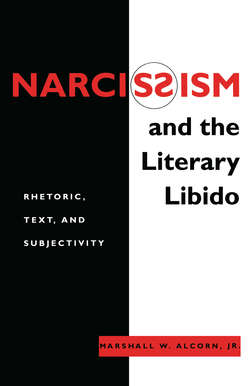Narcissism and the Literary Libido

Реклама. ООО «ЛитРес», ИНН: 7719571260.
Оглавление
Marshall W. Alcorn Jr.. Narcissism and the Literary Libido
Literature and Psychoanalysis General Editor: Jeffrey Berman
Narcissism and the Literary Libido
Contents
Foreword
Works Cited
Acknowledgments
ONE Political Ties and Libidinal Ruptures: Narcissism as the Origin and End of Textual Production
Notes
TWO Self-Structure as a Rhetorical Device: Modern Ethos and the Divisiveness of the Self
Theoretical Considerations
Implications
Orwell’s Ethos as an Aesthetic Manipulation of Self-Division
Notes
THREE Projection and the Resistance of the Signifier: A Reader-Response Theory of Textual Presence
The Status of the Text
Projection and Narcissism
Projection and the Materiality of the Signifier
Projection, Rhetoric, Idealization
Rhetoric as a Social and Private Force
Projection and the “Objective” Text
Notes
FOUR Character, Plot, and Imagery: Mechanisms That Shift Narcissistic Investments
Idealization
Character
Plot
Imagery
Repression and Imagistic Thought
Imagery and Cognitive Processes
Imagery and Rhetoric
Notes
FIVE The Narcissism of Creation and Interpretation: Agon at the Heart of Darkness
Conrad and Narcissism
Narcissism and Morality
Kurtz’s Rhetorical Power
Kurtz and Conrad’s Artistic Ideals
Notes
SIX Language and the Substance of the Self: A Lacanian Perspective
Notes
SEVEN Conclusion: What Do We Do with Rhetorical Criticism?
Notes
Bibliography
Index
Отрывок из книги
Narcissism and the Literary Libido
2. Loathsome Jews and Engulfing Women: Metaphors of Projection in the Works of Wyndham Lewis, Charles Williams, and Graham Greene by Andrea Freud Loewenstein
.....
This sculpturing of value in language is universal. Language comes to an author from a social world that structures emotion as it libidinally invests language with “living” form, shape, and weight. As it is reworked by an author, however, language develops its own unique form, shape, and weight. Furthermore, as readers respond to discourse produced by another, they libidinally edit and configure, according to their own interests, the sculptured “messages” they perceive in the discourse.
To the extent that literary products are linguistic mediums for narcissistic investments, they are also mechanisms for the social interaction of narcissistic investments. Literary texts bring diverse readers together in shared concerns. They designate a space where cultural values, ideological claims, and even cultural discourse itself, under the pressure of conflicting social and personal concerns, undergoes conception, debate, and evolution. Whereas private narcissistic investments often help us to appreciate texts, it is also true that rhetorical interactions with others give texts added depth and importance. Such interactions encourage us to objectify our narcissistic investments—to state what we think and how we care about texts. In these interactions we often discover that we idealize what others repress, just as others may idealize what we repress. In this manner, literary texts can, and usually do, become a space where individual narcissistic investments are vigorously and socially negotiated.
.....